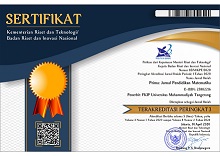THE EFFECT OF PROBLEM-BASED LEARNING MODEL ON ADAPTIVE REASONING ABILITY IN MATHEMATICS CLASS V ELEMENTARY SCHOOL
Abstract
The primary aim of this study is to enhance students' adaptive reasoning ability by applying the problem-based learning model. The chosen method, a pseudo-experiment with a non-equivalent control group design, was selected for its rigorous approach, instilling confidence in the research process. The population consisted of 105 students in class V, with a sample of 41 students selected, divided into 21 students in the control class and 20 in the experimental class, determined by the purposive sampling technique. The instrument used was a test to assess adaptive reasoning skills. The data analysis, conducted with an independent T-Test, revealed that the adaptive reasoning ability with the PBL model was higher than that of students who applied the expository learning model. These findings, based on a robust methodology, suggest that the PBL model has the potential to significantly enhance students' adaptive reasoning skills in mathematics.
Keywords
Full Text:
PDFReferences
Alfiah, S. K. D., Kadar, S., & Hatip, A. (2021). Pengaruh Problem Based Learning terhadap Kemampuan Penalaran Matematis dan Kemampuan Pemecahan Masalah. GAUSS: Jurnal Pendidikan Matematika, 4(2), 51–61. https://doi.org/10.30656/gauss.v4i2.3950
Ansari, B. I., Taufiq, T., & Saminan, S. (2020). The Use Of Creative Problem Solving Model To Develop Students’ Adaptive Reasoning Ability: Inductive, Deductive, And Intuitive. International Journal on Teaching and Learning Mathematics, 3(1), 23–36. https://doi.org/10.18860/ijtlm.v3i1.9439
Cahayaningsih, U., Jatisunda, M. G., Kurniawan, D. T., Nahdi, D. S., Utami, W. P., & Halipah, R. (2023). Implementing Problem-Based Learning to Enhance Students’ Mathematical Proficiency in Primary School. Jurnal Didaktik Matematika, 10(2), 281–299. https://doi.org/10.24815/jdm.v10i2.32615
Darmayanti, R., Sugianto, R., Muhammad, Y., & Santiago, P. V. da S. (2022). Analysis of Students’ Adaptive Reasoning Ability in Solving HOTS Problems Arithmetic Sequences and Series in Terms of Learning Style. Numerical: Jurnal Matematika Dan Pendidikan Matematika, 6(1), 73–90. https://doi.org/10.25217/numerical.v6i1.2340
Darwani, Zubainur, C. M., & Saminan. (2020). Adaptive Reasoning And Strategic Competence Through Problem Based Learning Model In Middle School. Journal of Physics: Conference Series, 1460(1). https://doi.org/10.1088/1742-6596/1460/1/012019
Hikmawati, F. (2020). Metodologi Penelitian. Depok. PT RajaGrafindo Persada.
Kotto, M. A., Babys, U., & Gella, N. J. M. (2022). Meningkatkan Kemampuan Penalaran Matematika Siswa Melalui Model PBL (Problem Based Learning). Jurnal Sains Dan Edukasi Sains, 5(1), 24–27. https://doi.org/10.24246/juses.v5i1p24-27
Marasabessy, R. (2021). Study of Mathematical Reasoning Ability for Mathematics Learning in Schools: A Literature Review. Indonesian Journal of Teaching in Science, 1(2), 79–90.
Marbun, H. D., Siahaan, T. M., & Sauduran, G. N. (2022). Pengaruh Model Pembelajaran Creative Problem Solving terhadap Kemampuan Penalaran Adaptif Matematis Siswa di kelas VIII SMP Swasta Trisakti Pematangsiantar. Jurnal Pendidikan Dan Konseling, 4(5), 8192–8202.
Oktaviana, D., & Haryadi, R. (2020a). Kemampuan Penalaran Adaptif Melalui Model Reciprocal Teaching pada Logika Matematika dan Himpunan. SAP (Susunan Artikel Pendidikan), 5(2), 124–130. https://doi.org/10.30998/sap.v5i2.7276
Oktaviana, D., & Haryadi, R. (2020b). Pengaruh Model Pembelajaran Problem Based Learning (Pbl) Terhadap Kemampuan Pemecahan Masalah Mahasiswa. AKSIOMA: Jurnal Program Studi Pendidikan Matematika, 9(4), 1076. https://doi.org/10.24127/ajpm.v9i4.3069
Oktaviyanthi, R., & Agus, R. N. (2020). Instrumen Evaluasi Kemampuan Penalaran Adaptif Matematis Mahasiswa. AKSIOMA: Jurnal Program Studi Pendidikan Matematika, 9(4), 1123. https://doi.org/10.24127/ajpm.v9i4.3150
Putra, D. A., & Widyasari, N. (2023). The Application Of Problem-Based Learning To Increase The Students ’ Self-Efficacy Of Grade 5 On Mathematics. Proceeding of International Seminar and Joint Research, 1(1), 94–100.
Rahmayani, E. S., & Fadly, W. (2022). Analisis Kemampuan Siswa dalam Membuat Kesimpulan dari Hasil Pratikum. Jurnal Tadris IPA Indonesia, 2(2), 217–227. https://doi.org/10.21154/jtii.v2i2.765
Sugiyono. (2021). Metode Penelitian Kuantitatif Kualitatif dan R&D. Bandung: Alfabeta.
Utaminingsih, M., Widjanarko, M., & Ismaya, E. A. (2022). The Effect of Problem-Based Learning Assisted by Peer Tutoring on Student’s Critical Thinking Ability. ANP Journal of Social Science and Humanities, 3(2),101–106. https://journalarsvot.com/index.php/anp-jssh/article/view/275
Wasiran, Y., & Andinasari, A. (2019). Meningkatkan Kemampuan Berpikir Kreatif dan Penalaran Adaptif Matematika Melalui Paket Instruksional Berbasis Creative Problem Solving. JNPM (Jurnal Nasional Pendidikan Matematika), 3(1), 51. https://doi.org/10.33603/jnpm.v3i1.1466
Widiastuti, W., & Kania, W. (2021). Penerapan metode diskusi untuk meningkatkan kemampuan berfikir kritis dan pemecahan masalah. Jurnal Pendidikan Ekonomi Indonesia, 3(1), 259–264.
Widyastuti, R. T., & Airlanda, G. S. (2021). Efektivitas Model Problem Based Learning terhadap Kemampuan Pemecahan Masalah Matematika Siswa Sekolah Dasar. Jurnal Basicedu, 5(3), 1120–1129. https://doi.org/10.31004/basicedu.v4i2.366
Zahra, A., Widyasari, N., & Irawan, B. (2020). Kesiapan Siswa Sd Dalam Pembelajaran Jarak Jauh Pada Mata Pelajaran Matematika.
Prosiding Seminar Nasional Penelitian LPPM UMJ, 1(1), 1–10. https://jurnal.umj.ac.id/index.php/semnaslit/article/view/8874
DOI: http://dx.doi.org/10.31000/prima.v9i3.12522
Article Metrics
Abstract - 411 PDF - 191Refbacks
- There are currently no refbacks.
Prima: Jurnal Pendidikan Matematika
Program Studi Pendidikan Matematika
Fakultas Keguruan dan Ilmu Pendidikan
Universitas Muhammadiyah Tangerang
Jl. Perintis Kemerdekaan I/33, Cikokol
Kota Tangerang, Indonesia
e-mail: primajpm@gmail.com
Prima: Jurnal Pendidikan Matematika (p-ISSN: 2579-9827 | e-ISSN: 2580-2216) is licensed under a Creative Commons Attribution 4.0 International License.







